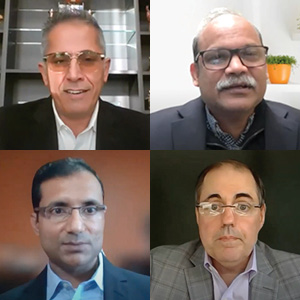MS in Information Systems Faculty Discuss Digital Transformation and AI in Tech Talk

From harnessing the potential of AI to reimagining workflows, faculty members of the Northwestern MS in Information Systems program and online undergraduate program discussed the dynamic landscape of today's digital transformation and its impact on shaping a smarter, more connected future. This dialogue took place during the online event "Tech Talk: Digital Transformation and Artificial Intelligence (AI)," held on December 12, 2023.
Faisal Akkawi, the faculty director of the Northwestern MS in Information Systems program, introduced the event's speakers, including fellow Northwestern SPS faculty members Amul Chapla, Principal Cloud Solution Architect at Microsoft; James DeMarco, a business leader and digital business strategy practitioner with over 25 years of experience; and Sunil Kakade, System Vice President of Enterprise Data and AI at CommonSpirit Health.
Throughout the event, the speakers shared the latest strategies propelling companies into the digital age by exploring the powerful synergy between business, technology, and innovation. They also provided practical insights along with real-world applications. Highlights from their discussion follow.
How has digital transformation evolved in the past few years with respect to AI and cloud computing?
James DeMarco: In the past 20 years, we have witnessed two seismic events that have really accelerated transformation as we know it. One was the pandemic in 2020, which disrupted ways of working in manners we still haven't fully grasped, which is one of the reasons why many of us on this call are taking this call from home today. But another seismic change happened on a specific date, November 20th, 2023; it's when OpenAI released ChatGPT onto the world. It was a bit of a coming-out party for generative AI, and a coming-of-age party for cognitive AI. It is a tech release that made OpenAI a household name and taught the world the word "generative." In the last year, AI has gone from being an operations back road, back-office product roadmap discussion to a boardroom priority, and that has caused an enormous rippling effect across industries.
We see the desire and demand to simplify operations, the construct of improving customer engagement, but also supporting the humans who are doing our businesses. DT is not optional anymore. It really is a question of existential operational growth and existential survival for many businesses, where the cost of innovation now is always universally less than the cost of not innovating. I think that's a fundamental seismic shift and largely driven by the fact that the cloud has made everything ubiquitously available, and AI has made things a whole lot easier to do.
What is the future landscape of AI and digital transformation?
Amul Chapla: In the next two to five years, AI is expected to become even more ingrained in every business process and consumer experience. Whether it's personalized recommendations or automated customer service, we will see AI usage exponentially increase. With this expansion, we will witness a shift in the job market and an opportunity for upskilling. We'll see a need for skills around applied generative AI, involving taking these prebuilt powerful models and using them to support specific business use cases and customer experience needs. Instead of creating traditional AI or machine learning models, the skill requirement will shift towards leveraging these powerful large language models using prompt engineering, chain of thought, and other techniques.
We will also see the democratization of AI platforms and tools, making it much easier to create and deploy AI-powered applications in a user-friendly way. You will no longer need deep development or data science expertise to utilize these powerful models. This will lead to the evolution of low-code, no-code platforms to enable the needs of various businesses.
And the last thing I would mention, which is as AI becomes more prevalent, ethical considerations and governance will become much more important. We will need to establish AI guiding principles that ensure AI is fair, transparent, and explainable. There will be an evolution of both our requirements and government requirements, and tools and platforms to align AI technology with organizational needs in a compliant and safe manner.
Sunil Kakade: With technology becoming more normalized and models more sophisticated, the focus shifts to talent transformation. Software will continue to be built and new architectures and frameworks will emerge, but as technology becomes more powerful, we need to have talent that understands the responsibility of handling these tools and technologies. Until now we were living in the era of engineers. Engineers are now expected not only to build but to build responsibly, to build with fault tolerance so that nothing can go wrong with the powerful technology. Northwestern's curriculum addresses this need by teaching how to adopt these technologies responsibly, creating trustworthy solutions for industries like healthcare.
About the Northwestern SPS Thought Leadership Event Series
This event was part of the Northwestern University School of Professional Studies Thought Leadership Series, a program of online events featuring a wide range of compelling topics and thoughtfully led conversations throughout the 2023–24 academic year.
If you are interested in learning more about the Northwestern University SPS Thought Leadership event series, please contact us at SPS@northwestern.edu and ask to be added to our email list.
Northwestern University School of Professional Studies offers many degree and certificate programs, with evening and online options available. To learn more about how Northwestern University's Graduate Programs in Information Systems prepares graduates to advance their careers, fill out the form below and we will be in touch with you soon.
